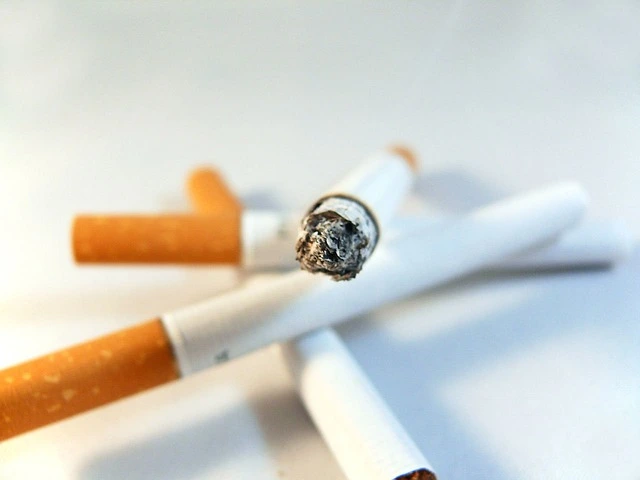What's On This Page
Both tea and cigarettes contain nicotine, but the levels or amounts differ. Tea boosts your thinking capacity as a cigarette does, but the addiction levels differ. Some users tea when they are trying to quit cigarettes. For more information about the two components, this article will take you through a comparison.
Nicotine in tea
Tea is a beverage that contains nicotine. Nicotine is an addictive substance that is absorbed differently than the nicotine in cigarettes, posing little risk to your health, but you should be worried about its safety.
Nicotine in tea is absorbed differently than nicotine in cigarettes, making it less harmful and addictive. The nicotine in liquid tea is broken down via your digestive tract, lasting several hours depending on how much you drink. Since it is absorbed via digestion, the nicotine in tea cannot produce the same immediate, addictive effects as nicotine inhaled into your lungs.

Due to its low levels and slow absorption rate, the nicotine in tea is not addictive. It does not cause nicotine cravings, trigger nicotine addiction, or cause side effects. That is why tea is safe for people trying to quit tobacco products. Antioxidants in green tea may help treat nicotine toxicity, which is cellular damage to the heart, lungs, kidneys, and liver caused by excessive nicotine intake.
Tea harbors some nicotine at low levels. It is absorbed slowly and released into liquid tea. The trace amounts of nicotine in tea are not harmful or addictive. Even if you are limited to nicotine products or trying to quit them together, you can have tea.
Pros
- Not harmful
- Less addictive
- Energy boost
- No side effects
- Lower anxiety levels
Cons
- It may increase your blood pressure
Nicotine in cigarette
The nicotine in inhaled tobacco products like cigarettes is absorbed via your lungs, delivering nicotine to your brain within 10–20 seconds of taking a puff. Your intake is about 1.1 to 1.8 mg of nicotine by the end of each cigarette, meaning a pack of 20 cigarettes, which makes you inhale between 22 to 36 mg of nicotine.
Nicotine is a stimulant from tobacco products and e-cigarettes. When it comes to the effects it can have on your brain, smoking is addictive. A single cigarette may contain 6 milligrams (mg) of nicotine. On the high end, about 28 mg.
You do not inhale every milligram of nicotine as it burns. You might only inhale about 1.1 to 1.8 mg of nicotine by the end of each cigarette, meaning for a pack of 20 cigarettes, you may inhale between 22 to 36 mg of nicotine.

Your body absorbs nicotine quickly. Once you inhale, the nicotine goes from your lungs into your bloodstream and right to your brain in seconds. The average unlit cigarette can contain up to 600 different substances (Lung.org).
As it burns, though, a cigarette may produce 7,000, 69 of them linked to cancer. When you stop smoking, and your nicotine levels go down, your body craves it because your brain fails to make enough acetylcholine on its own. Nicotine also can mimic dopamine. Nicotine alters the chemical functions in your brain.
It is an addictive stimulant in cigarettes, cigars, and vaping products. Different products have different levels of nicotine. The average amount of nicotine in a cigarette is around 10 to 12 mg. That varies widely from one brand to the next. While cigarettes contain fewer harmful substances, they still contain chemicals associated with cancer.
Its addictive tendencies make quitting smoking hard due to the addictive effects of nicotine. If not possible, reach out to your doctor for help.
Pros
- Reduce appetite and weight gain
- Increase brain receptors
- It fights depression and anxiety disorders
- Relaxation
- Relieve stress
Cons
- High nicotine
Favourite Features
Nicotine in tea
Absorption level
Due to its low levels and slow absorption rate, the nicotine in tea is not addictive. It does not cause nicotine cravings or nicotine addiction, nor cause any side effects. Tea is safe for people who are trying to quit tobacco products.
Digestion
For tea, nicotine is found in trace amounts and absorbed via digestion. The nicotine in tea does not give immediate, addictive effects as nicotine is inhaled into your lungs.
Composition
Tea is dry leaves. The more you boil the leaves, the more nicotine is released. No matter how much you heat the leaves, the nicotine content will not amount to that of a cigarette.
Nicotine in cigarette
Chemicals
The smoke from tobacco products contains more than 7,000 chemicals. Nicotine is the primary component of tobacco, which drives tobacco addiction. Multiple compounds are added to tobacco to enhance its flavour and the absorption of nicotine. As nicotine enters the body, it releases chemicals that help to relieve stress and pain and improve mood.
Smoke
The cigarette is an efficient and highly engineered drug-delivery system. As you inhale tobacco smoke, the average smoker takes 1–2 milligrams of nicotine per cigarette. When tobacco is smoked, nicotine reaches peak levels in the bloodstream and enters the brain. A person who smokes about one pack daily gets 200 hits of nicotine to the brain each day.
Brain system
Frequent use of nicotine changes the way the brain works with self-control, stress, and learning. Long-term changes can lead to addiction and withdrawal symptoms when a person decides to quit smoking (Cancer.gov).
What could be better
Nicotine in tea
- It could have been less effective in causing High blood pressure.
Nicotine in cigarette
- A minimal nicotine amount would have been better.
Similar Features
- Both cause high blood pressure.
- Both tea and cigarette have nicotine.
Key Differences
- Nicotine in tea is absorbed differently than the nicotine in cigarettes. Nicotine is inhaled in tobacco products and consumed through the mouth in tea. The nicotine in liquid tea breaks down your digestive tract.
- Cigarette cause oxidative damage, whereas tea polyphenols have strong antioxidant properties.
The verdict
In conclusion, both tea and cigarette contain nicotine but on different levels. For minimal nicotine effects, tea may be your best pick. If you want the effects of nicotine in full force, a cigarette might be your pick, although it has many disadvantages than advantages. It is up to you to take any of the two.
Leave a Reply